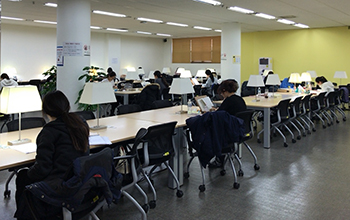
Confusion surrounding the possibility of the abolishing the Higher Civil Service Examination (HCSE, also known as Grade 5 Civil Service Examination) is leaving many students distressed. With the discontinuation of the Foreign Service Examination and the National Bar Exam, many students are increasingly concerned over the repeated elimination of national exams.
“The continuous termination of national exams is leaving me worried,” said Jo Yu-jin, a student in Yonsei University. “It seems as if ways for getting a government job are being discontinued one by one.”
Lawmakers’ request to abolish the HCSE first emerged in 2010, during the Lee Myong-bak administration. The necessity for the change with regard to the bureaucratic system was the main ground for the request.
As Grade 5 is higher than Grade 7, the HCSE is a higher version of the Grade 7 Civil Service Examination. Examinees who have passed the HCSE are able to work in higher positions of government. Therefore, it has been considered as a highway to success for decades.
The issue of the HCSE abolition was re-introduced this year after The Minjoo Party of Korea stated on Jan. 19 that it plans to eliminate the HCSE and standardize the examination process as part of the Grade 7 Civil Service Examination. After the standardization, candidates for higher government jobs will be selected after they pass the Civil Service Examination and gain government experience. The abolition is seen to be highly likely after this year’s presidential election, as the current most popular candidate, Moon Jae-in, is a member of The Minjoo Party.
The two sides of the argument are mainly divided between the efficiency and the rationality of the current system. Pro arguments state that civilians who pass the HCSE usually lack experience and expertise for powerful positions. Additionally, they state that the amount of time and money examinees spend on preparing for the HCSE is a waste of society’s capital and that a cartel culture is formed among those elitist civil servants who passed the test.
“Though I do not agree with the HCSE abolition, The Minjoo’s additional plan to permanently evict government officials who are corrupt or have committed sex crimes is agreeable,” said Oh Eun-ju, a student in Korea University.
In contrast, those who go against abolition ground themselves in rationality and insist that elimination of the exam will greatly undermine the integrity in the employment process.
“The selection of skilled workers who passed the Civil Service Examination will no longer be transparent,” stated an anonymous International Studies student preparing for the exam. “The possible lack of objectivity will cause much controversy.”
The opponents of the abolition, mainly examinees and politicians, say that as the HCSE only evaluates the skills of the examinees, the test opens roads for all with an objective standard. Others note that the HCSE also encourages talented people to apply for government jobs.
Many against the HCSE abolition draw their ideas from the controversy arising in the aftermath of the elimination of the Foreign Service Examination and the National Bar Exam.
“The current state and image of the law schools and the Korea National Diplomatic Academy are not helping to alleviate people’s skepticism of the new system’s impartiality being fair,” Jo said. “The schools and academies are expensive and selective, thus limited to people from good schools who can afford the cost.”
As Jo states, according to Kim Do-eup of the Liberty Korea Party (former Saenuri Party), after abolishing the Foreign Service Examination, 91 percent of newly appointed diplomats in 2016 were from universities within Seoul. The data proves the original intent of the new system to employ people from various backgrounds has backfired, fueling the claims that law schools and the Korea National Diplomatic Academy will facilitate favoritism and corruption, and thus, the HCSE should not be abolished.
Seen as the best method of employment for government job seekers, the HCSE’s elimination is not welcome to many students. This change greatly concerns Ewha students as Ewha always has a large number of students who are preparing for or who have already passed national exams. Ewha was ranked as the university to produce the fourth highest number of students to pass the bar exam in 2016, and students who passed the HCSE with the highest score in both 2015 and 2016 were from Ewha. Ewha students should therefore reflect on this ongoing political debate over national exams, and so should other university students in Korea.

